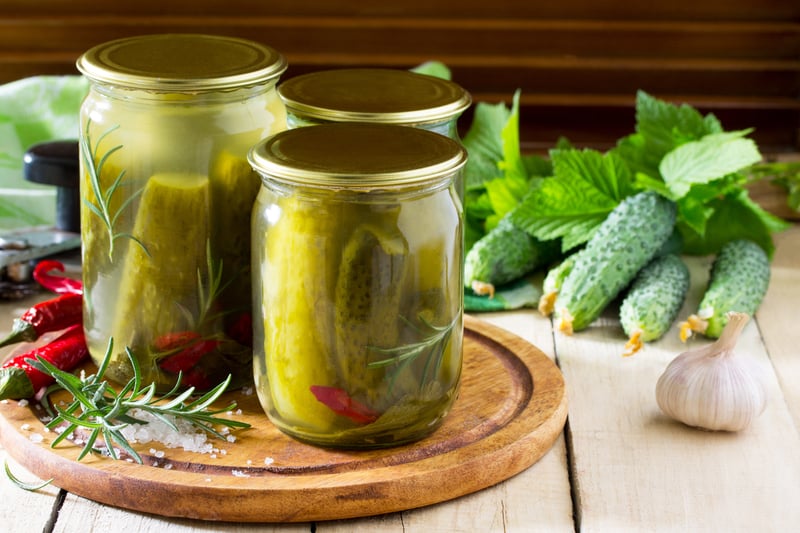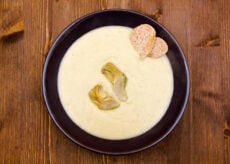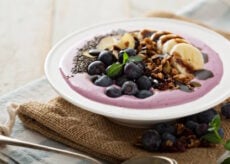Is Drinking Pickle Juice Good For You? Here’s the Dill…

Isn’t it amazing that a few simple everyday ingredients can not only transform foods from bland and boring to aromatic and tangy, but also have a few health benefits up their sleeves? Let’s take a look at pickle juice, for example. While you may use a bit to add extra flavor to a dish, you probably just toss the juice once the pickles are all gone. Is that really a good idea? Is drinking pickle juice good for you?
What’s in Pickle Juice Anyway?
The basic elements of pickle juice are vinegar, which contains four hydrogen, two oxygen, and two carbon molecules; water, which contains two hydrogen and one oxygen molecules; and salt, which contains sodium and chloride. Toss in a few additional herbs and flavors, and you have yourself a mighty fine brine.
Show of hands—who has ever drunk the juice from a jar of pickles? Nobody? Me neither. I can honestly say, until recently, I had never once thought of tipping back the empty jar of pickles to consume the leftover juice. Nope. It wasn’t on my list. But maybe it should be? And with keto being all the rage, there is definitely more buzz about the benefits of pickle juice.
So, Is Drinking Pickle Juice Good For You?
Though you’ve probably heard me joke in the past about my distaste for running, I actually used to run in my spare time—for fun, basically. But it never failed, I would get leg cramps. According to an article in the New York Times, you will likely experience reduced muscle cramping within a minute and a half after drinking pickle juice. Furthermore, the good folks over at Livestrong have said, “Drinking pickle juice appears to reduce cramping about 45% faster than just drinking water.” Who knew?
The National Institutes of Health found that consuming high-sodium drinks before exercising can improve thermoregulation (the internal regulation process that stabilizes core temperature) and overall workout performance. Maybe drinking pickle juice could have eliminated stopping short on all those runs, and who knows, maybe even resulted in a few weightlifting PRs?
Some folks would argue that pickle juice is a hangover cure. Perhaps due to its ability to replenish lost electrolytes and fluids. This may be one reason why “picklebacks” are so popular. Never heard of a pickleback? It is simply chasing a shot of whiskey with a shot of pickle juice. Perhaps the folks who invented this were trying to avoid the hangover by taking back-to-back shots. Crazy or genius? (Really, you can’t make this stuff up!)
As noted in a previous article on vinegar, vinegar has its own host of health benefits. Several studies have shown its positive effect on blood glucose levels. In a 2007 study of participants with Type 2 diabetes, for example, two tablespoons of vinegar before bed was shown to help lower glucose in the morning by four to six percent.
Another study with patients who have been diagnosed with Type 2 diabetes showed vinegar may reduce postprandial hyperglycemia, hyperinsulinemia, and hypertriglyceridemia without affecting lipolysis (fat burning). This further confirms the glucose-lowering effect in people with glucose abnormalities.
We all know that proper digestion is the key to overall health and wellness, right? Did you know that some doctors believe that pickle juice helps to maintain a healthy balance of good bacteria in your stomach? Additionally, while some folks who suffer from heartburn may notice their symptoms exacerbated from drinking pickle juice, others claim it relieves it.
If you have ever been the victim of too much time in the sun, then you know what a lifesaver aloe vera can be. But did you know people apply pickle juice on sunburns for relief as well? I haven’t tested this method myself, but when I do, I will report back and let you know how my skin fares.
One of my favorite dynamic duos, Chip and Joanna Gaines, turned me onto a trick for cleaning and/or distressing copper—pickle juice! If you have ever caught an episode of Fixer Upper, then you are already in the know of some of their tried-and-true methods for transforming furniture and household items into treasures. But who knew pickle juice was a cheap, easy, and effective DIY solution?
The reason it works is because of the salt and vinegar in the pickle juice itself. They offer the disclaimer that the longer you leave the solution on the copper, the more aged your copper will begin to look. I think I will test this out on a penny before taking the plunge on something of more value.
As you can see, pickle juice is a very impressive byproduct of pickles and can be used for a variety of things. The next time you are tempted to toss out the brine—think again!
I am including a recipe for those of you who may want to try your hand at making a homemade batch. I am, however, more partial to pickling peppers or cucumbers, so at least I can have something crunchy to snack on in between shots. 😉
Coach CP’s Pickle Juice Recipe
Ingredients:
- 1 cup water
- 1/2 cup white vinegar
- 2 Tbsp Himalayan pink salt
- 1 whole garlic clove, sliced
- 1 tsp red pepper
- 1 tsp dill
Directions:
- Add the first three ingredients together over medium-high heat.
- Add remaining ingredients and simmer until all the flavors marry.
- Let mixture cool, and store in the refrigerator.
- Enjoy!
According to the USDA, roughly 1/2 cup (or 4 ounces) of pickle juice contains about:
- 20 calories
- 0 grams of protein or fat
- 4 grams carbohydrates
- 920 mg sodium
Chef Note: This mixture can last up to 3 weeks in the fridge.
Chef Note: You could also use white wine vinegar in place of the white vinegar.
Chef Note: You could also use regular kosher salt if you don’t have Himalayan Pink Salt.




 7 Signs Your Body is Seriously Low on Collagen (not just wrinkles)
7 Signs Your Body is Seriously Low on Collagen (not just wrinkles) Health Expert: "Turmeric Doesn't Work (unless...)"
Health Expert: "Turmeric Doesn't Work (unless...)" 3 Warning Signs Your Probiotic Supplement is a Total Waste
3 Warning Signs Your Probiotic Supplement is a Total Waste

